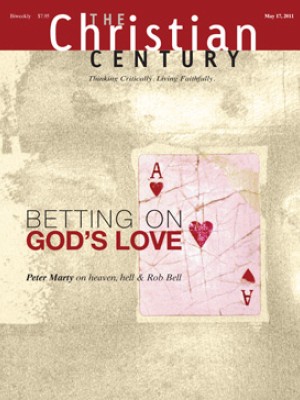In praise of imbalance: The holy rhythms of life
Everyone is talking about balance. It's like the Holy Grail. We all want to know where to find it. We want a balanced checkbook, a balanced diet and a balanced portfolio. Most of all, we are striving for the right balance between our work lives and the rest of our lives.
In the 1970s we began calling this the work-life balance. Pastoral ministry is perceived as particularly threatening to the proper work-life balance. We grill candidates for ordination about their plans for keeping balance in their lives with a vigor that was once reserved for rooting out heresies.
Read our latest issue or browse back issues.
I recently came across a website that promises to help. It features a work-life balance calculator. On the screen you estimate the amount of time each week you spend in six activities: work, sleep, meals, commute, leisure, chores. As you do that, a pie chart shows you how you have divided your time and how much time you have remaining to allocate among those six activities.
Before I could finish plugging in estimates for each of the six activities, however, a pop-up window announced, "You are four hours over your 168-hour limit. Please adjust." So I adjusted my estimates to get everything in balance. I was successful—no pop-up screen. But then I noticed that I had left no time for meals. Obviously, that was not going to work, so I tried again. I discovered that if I reduced the hours for chores for the week and slept half an hour less each night, it would all work.
Even as I printed out my perfectly balanced chart, I knew that it was worthless because, although I'd achieved a balance on the screen, I was not going to see this balance in my real life. My life has never been in balance. Well, that's not entirely true. I think there was an afternoon in the summer of 1983 when my life was in balance.
In the end, the whole concept of balance sounds exhausting, like balancing on one foot or balancing a tray of full glasses while walking on a rocky path. I can do it, but not for long.
Lately, as I look back on my efforts and failures at balance, I ask myself, who really wants to lead a balanced life? The times I've been happiest—when I was raising young children or consumed with a project—my life has been decidedly out of balance. At such times I have brought such singular focus to the task at hand that everything else seemed to fall by the wayside. I willingly go with less sleep and sometimes even have to remind myself to eat.
The Bible does not extol balance as a virtue. Instead, the Bible commends a way of life that is more about rhythm than it is about balance. There is the rhythm of the week, six days of work and one day of rest, set within the larger rhythms of the liturgical year. Jesus spent time in intense engagement with the people around him in rhythm with time alone or with close friends. Then there is the basic spiritual rhythm of breathing in and breathing out.
Moses, the prophets and Jesus himself did not lead balanced lives; in fact, their lives were wildly out of balance as they pursued what they took to be God's call. But they did let their lives sway to holy rhythms.
In the holy rhythms of life, there really is a time for every purpose under heaven: a time to focus on the task at hand as if nothing else in the world matters and a time to leave that task as if it didn't matter at all; a time to work, even to the point of exhaustion, and a time to rest; a time to be fully engaged and a time to be fully disengaged; a time to breath out and a time to breathe in; a time to be out of balance in one direction and a time to be out of balance in the other direction.
I can stand on one foot, but not for long. It's discouraging and not much fun. But when I respond to the rhythms of creation, in my breathing, in engagement and disengagement, in consuming work and restoring rest, it is more like dancing—first one foot and then the other.
Balance or rhythm? Standing on one foot or dancing? Which one sounds more life-giving?






